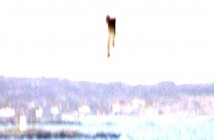
Cast: Ronald Mlodzik, Jack Messinger, Iain Ewing
Director: David Cronenberg
Country: Sci-Fi
Genre: Canada
Editor’s Notes: The following review is part of our coverage for TIFF’s From Within: The Films of David Cronenberg which runs from November 1st to January 19th at TIFF Bell Lightbox. For more information on upcoming TIFF film series visit http://tiff.net and follow TIFF on Twitter at @TIFF_NET.
Examining David Cronenberg’s first short feature, Stereo, offers a lot of insight for film enthusiasts. The film is difficult to take in as a pure entertainment, but as a relic of the auteur’s beginnings in the world of filmmaking it’s a fascinating piece.
The film has a loose storyline that centres around a group of young men and women who are housed in a research facility in northern Ontario. The purpose of this facility seems to be to examine the development of psychic abilities and extra sensory powers. The film flows through the architecturally interesting landscape of the University of Toronto’s Scarborough campus. The brutally modern approach to corporate and institutional construction in the 1960’s lends itself quite well to the science fiction tone that Cronenberg was going for. We follow this group of young psychics as they interact with each other and attempt to develop their powers. The voice over that plays throughout the film doesn’t necessarily reflect the action on-screen, but it certainly compliments it. We hear a series of jargon that sounds as though it was lifted directly out of a medical text book. This dialogue is delivered so convincingly that it’s difficult to distinguish the facts from the obvious fictions. By the end of the film it’s unclear as to whether the research has produced any actual results, but the audience is left satisfied having been taken on an experimental journey into a sci-fi universe.
Stereo is reminiscent of science fiction novels of the 1950’s and 1960’s. The world that is depicted is stark and cold and the characters seem a little distant.

Stereo is reminiscent of science fiction novels of the 1950’s and 1960’s. The world that is depicted is stark and cold and the characters seem a little distant. This tone was prominent in the works of Harlan Ellison, Robert A. Heinlein and Arthur C. Clarke and it is reflected throughout Stereo, which is no surprise considering Cronenberg’s early career aspirations were to become a science fiction novelist rather than a filmmaker. While the overall tone is a bit cold, the characters in the film express a full range of emotions. They are after all, young and full of sexual energy.
The film suffers slightly from being a student production. The limited budget made for some odd choices, specifically with the Victorian and Shakespearean inspired costumes that were obviously borrowed from the Universities drama department. The acting sometimes bordered on the melodramatic edge of pantomime, but again these are students making a film, so we can’t judge them too harshly.
The film showcases a lot of Cronenberg’s trademark theme’s in an embryonic state. Almost all of the overarching themes he establishes in Stereo are revisited later in his career.
The film showcases a lot of Cronenberg’s trademark theme’s in an embryonic state. Almost all of the overarching themes he establishes in Stereo are revisited later in his career. In a sequence where we see the subjects having their larynx’s removed we can see the theme of body transformation that would be the focus of The Fly, a scene depicting multiple psychics linking their minds together is a foreshadowing of Scanners and of the theme of identity that is examined in many of Cronenberg’s later films. Aside from this, the obvious science fiction and horror undertones that are present throughout Stereo make their back into almost all of Cronenberg’s later work.
With all the seriousness and stark pretension that the film offers, it’s sometimes hard to reflect on the sly sense of humour that is present throughout. Specifically in a scene discussing the nature of hetero, homo, bi, and omni sexualities where the group of young psychics are seen to be gleefully munching on peaches and ingesting aphrodisiacs. The action in this scene is obviously taking a crack at the subject matter being discussed in the voice over and it plays out similar to something Woody Allen would have offered in Everything You Always Wanted To Know About Sex (But Were Afraid To Ask).
At 65 minutes, Stereo is the perfect length for an interesting and informative short feature. Often it is paired with Crimes of the Future which offers a similar approach to the filmmaking, but tackles a different set of themes and concepts. The two films work well together but they are not necessarily to be viewed as a pair. Stereo offers a vision of a future ruled by cold logic and emotionless pragmatism, with a good sense of humour to keep it all in check. The pacing and the subject matter make it difficult to take this film in on a level other than academic curiosity, but as such a relic it serves its purpose quite well.
[notification type=”star”]70/100 ~ GOOD. The film is difficult to take in as a pure entertainment, but as a relic of the auteur’s beginnings in the world of filmmaking it’s a fascinating piece.[/notification]



